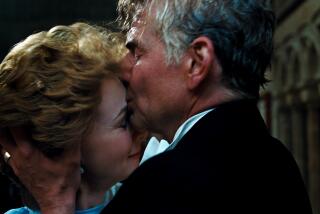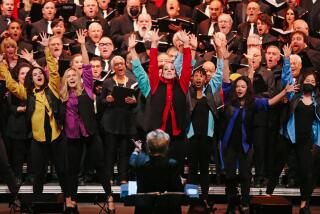Hall Leads Verdi Requiem
Although Verdi backed into his monumental Requiem with dour misgivings, there is nothing tentative or circumspect about the finished product. Sunday evening at the Orange County Performing Arts Center, William Hall gave this outsize work its theatrical due with his Master Chorale and Orchestra, the Chapman University Choir and a stentorian solo quartet.
Hall attended to details of the score--particularly articulation and dynamics--with a Toscanini-like fervor. There was an element of exaggeration here at times, with the interpretive emphasis placed almost entirely on the apocalyptic thunder of the Day of Wrath and everything else left merely tremulous anticipation or response. This is not, we know, liturgical music, but it can be devotional as well as dramatic, and Hall’s reading was least convincing in the most reflective passages.
Much of the work in that area falls to the quartet, of course. Hall’s team seemed unified primarily by wide vibrato and generous portamento, and, like the conductor, happiest at full operatic throttle.
Ai-Lan Zhu’s bright, edgy soprano and Wendy Hillhouse’s uneven mezzo--opulent on top, gruff on the bottom--combined effectively in the Recordare and far less so in a lethargic Agnus Dei. Individually, they proved conscientious in some very difficult music, but their emotional reactions sounded manipulative and undermotivated.
Tenor Ravil Atlas navigated the Ingemisco cautiously, straining rather than blossoming on the crests. That hurdle past, he sounded notably more comfortable in the ensuing ensembles and introduced a warmly joyful Hostias. Bass Louis Lebherz anchored ensembles plangently and in the Confutatis projected the most Verdian nuance.
Clearly well-drilled, Hall’s massive combined chorus sang with agility as well as power, across a huge dynamic range. The fugues held no terrors for this group, which seemed to relish challenges. Hall also had an accomplished orchestra on hand, a bit lean in strings for so many voices, but crisp and full of character. In a moment that may define the dramatic exaggeration of the performance, at the beginning of the Tuba Mirum, Hall turned his back to the legion onstage to give flamboyant cues to the four trumpets in the balcony--the triumph of gesture and effect over content and context.
More to Read
The biggest entertainment stories
Get our big stories about Hollywood, film, television, music, arts, culture and more right in your inbox as soon as they publish.
You may occasionally receive promotional content from the Los Angeles Times.










